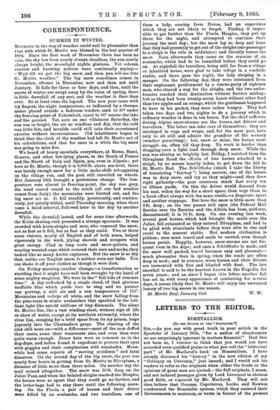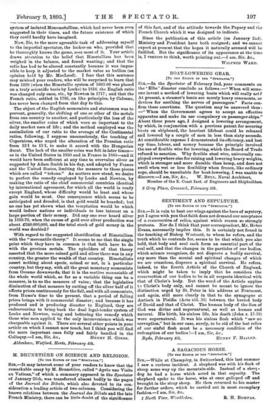LETTERS TO THE EDITOR.
BIMETALLISM.
[To THE EDITOR OF TEl " SPECTATOR:1 SIR,—As you say with great truth in your article in the Spectator of January 26th, "for a nation of shopkeepers we are surprisingly ignorant in matters financial." Had this not been so, I venture to think that you would not have accorded even qualified praise to what you call the " histotical part" of Mr. MacLeod's book on Bimetallism. I have already discussed his "history" in the new edition of my "Colloquy on Currency," just issued ; and I would ask his readers to refer to the originals when either the deeds or the opinions of great men are quoted,—the full originals, I mean, and not isolated passages given by Lord Liverpool in obvious good faith, or repeated by Mr. MacLeod. They will not then believe that Oresme, Copernicus, Locke, and Newton condemned the Bimetallic system, which they assisted their Governments to maintain, or wrote in favour of the present
system of isolated Monometallism, which had never been even suggested in their times, and the future existence of which they could hardly have imagined.
Now, Sir, to the more agreeable task of addressing myself to the impartial spectator, the looker-on who, provided that he thoroughly knows the game, sees most of it. Your article draws attention to the belief that Bimetallism has been weighed in the balance, and found wanting ; and that the ratio has had to be altered constantly because it was impos- sible to keep it adjusted to the market value as bullion (an opinion held by Mr. MacLeod). I fear that this sentence may mislead your readers, who will be surprised to learn that from 1699 (when the Bimetallic system of 1663-66 was placed on a truly scientific basis by Locke) to 1816. the English ratio was changed only once, viz., by Newton in 1717; and that the French ratio, settled in 1785, on like principles, by Calonne, has never been changed from that day to this.
The object of the English economists and statesmen was to prevent, generally, the shifting of one or other of the metals from one country to another, and particularly the loss of the silver, the smaller coins of which were so important to the daily market uses of life ; and the method employed was the assimilation of our ratio to the average of the Continental ratios, following, I suppose unconsciously, the teaching of Copernicus, who urged the alteration of the Prussian ratio from 121 to 11.1, to make it accord with the Hungarian ducat. The lack of the smaller coins was felt in later times— as in the United States in 1850 and in France in 1860—and it would have been sufficient at any time to overvalue silver as suggested by Adam Smith in his day, and adopted by France and the United States, limiting the measure to those pieces which are called "tokens." As matters now stand, we desire to perfect the remedy employed by Locke and Newton, by making the ratio of the chief commercial countries identical by international agreement, for which all the world is ready except England, whose difficulty would be least and whose gain would be most. One consequence which seems to be anticipated and dreaded, is that gold would be hoarded ; but no one has yet shown what the temptation would be which would induce nations or individuals to lose interest on a large portion of their money. Did any one ever board silver in 1850-70, when the excess of gold over silver production was about £340,000,000, and the total stock of gold money in the world was doubled ?
With regard to the suggested identification of Bimetallism with the "mercantile theory." It seems to me that the single point which they have in common is that both have to do with the precious metals. The upholders of that theory asserted that the more coined gold and silver there was in any country, the greater the wealth of that country. Bimetallists assert nothing about specie, coined or not, in a particular country, but they say, with all the great monetary economists from Oresme downwards, that it is the matiere monnoiable of the whole world which, so far as a variable thing can be a measure, is to us the measure of value ; that the legislative diminution of that measure by cutting off the silver half of it affects prices continuously for the fall, and with all economists, from Flume's time to the present, that a period of falling prices brings with it commercial disaster; and because it has produced and is producing disaster to England, they are endeavouring to bring back the dual legal-tender system of Locke and Newton, using and bettering the remedy which those wise men applied to the only inconvenience which was chargeable against it. There are several other points in your article on which I cannot now touch, but I think you will find the more important ones fully and fairly handled in the Aldenham, Watford, Herta, February 4th.







































 Previous page
Previous page